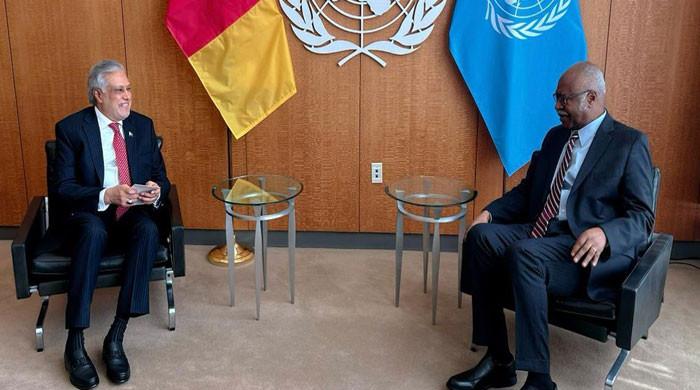Ishaq Dar Highlights India’s IWT Violation at UN
In New York on Monday, Deputy Prime Minister and Foreign Minister Senator Mohammad Ishaq Dar engaged with President of the United Nations General Assembly, Philemon Yang, addressing critical issues including India’s non-compliance with the Indus Waters Treaty (IWT).
Their discussions encompassed various global matters, such as the circumstances in the Middle East, happenings in Iran and Afghanistan, and broader concerns across the region.
The two leaders also addressed pivotal subjects on the UN agenda, notably initiatives aimed at fostering sustainable progress.
The Foreign Minister reiterated Pakistan’s firm dedication to multilateralism and the UN’s central role in global affairs.
He advocated for enhanced global governance and reforms within the UN system to better serve the collective interests of the international community.
The DPM lauded the President of the United Nations General Assembly for his leadership in advancing the Pact for the Future and the UN80 Initiative. He stressed the importance of aligning these endeavors to create a more impactful, inclusive, and responsive UN capable of tackling contemporary challenges.
The matter of Security Council reform was also discussed, including the necessity of making the Council more democratic and efficient.
Senator Dar voiced profound apprehension regarding India’s assertive stance, misinformation operations, and breaches of the IWT, all of which jeopardize regional peace. He urged immediate international consideration of New Delhi’s conduct, citing unlawful actions in Indian Illegally Occupied Jammu and Kashmir (IIOJK) and backing of terrorism against Pakistan through its affiliates.
Dar emphasized the imperative of resolving all disputes between Pakistan and India through peaceful dialogue, in accordance with international law, UNSC resolutions, and the UN Charter.
The President of the UN General Assembly affirmed his commitment to promoting peace, advancement, and inclusivity within the General Assembly’s framework. He shared his vision for advancing effective multilateralism and the United Nations’ significance in serving all of humanity.
Earlier that day, the DPM spoke at the high-level political forum on sustainable development at the UN, observing that developing nations require debt relief and access to grant-based resources to achieve sustainable progress.
He conveyed Pakistan’s strong commitment to the 2030 Agenda, adding that the nation has initiated transformative measures to stimulate inclusive growth, bolster climate resilience, and enact economic overhauls.
The deputy prime minister pinpointed the global food crisis and climate change as major challenges confronting the world.
He stated that the Uraan Pakistan program represents a substantial initiative for national advancement, while Danish schools are being established for disadvantaged children, including those identified through Nadra.
He also mentioned Pakistan’s support for the middle class through the Benazir Income Support Programme (BISP), ensuring inclusivity.
Dar further indicated the nation’s objective to source 60% of its energy from renewable sources by 2030. Initiatives like Recharge Pakistan and Living Indus are contributing to enhanced climate resilience, and youth empowerment is being promoted via the Digital Youth Hub and Danish School networks.
He noted that macroeconomic reforms are assisting in stabilizing the economy and making Pakistan appealing for investment. Dar underscored the Special Investment Facilitation Council’s (SIFC) role in attracting foreign investment to priority sectors.
Highlighting the necessity for global financial reforms, Dar asserted that fundamental changes to the international financial architecture are crucial for achieving the Sustainable Development Goals (SDGs).
He concluded by stating that the UN’s 80th anniversary presents an opportunity to fortify the organization and enhance its responsiveness to current challenges.



Comments (0)
No comments yet. Be the first to comment!
Leave a Comment